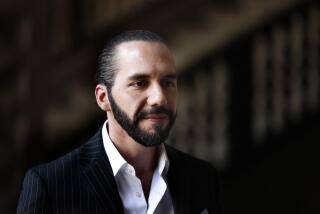Botha Pledges Law and Order in South Africa
- Share via
JOHANNESBURG, South Africa — President Pieter W. Botha acted Wednesday to deal with South Africa’s mounting unrest, ordering tough measures to “restore and maintain law and order” and warning that he is ready to crack down hard on the government’s opposition if the turmoil continues.
Botha, speaking to a special joint session of Parliament in Cape Town, did not disclose what the “appropriate steps” are but said that they are strong and uncompromising. He said that not only the rule of law but also the fate of the nation is at stake in the growing unrest.
“I am committed to maintaining law, order and stability in our society,” he said, adding that this must come before any reform of the country’s political system or of its apartheid policy of racial segregation.
Botha lashed out at people campaigning against apartheid and protesting the fatal police shooting of 19 blacks a week ago. He grouped them with those responsible for the widespread arson in the country’s black townships, the killing of local black officials perceived as collaborators and the often mindless violence of the recent unrest.
“It saddens me that certain people under the guise of moral and religious conviction should take the lead in fomenting disobedience, violence and destruction,” Botha said, referring to church and community leaders now at the forefront of the anti-apartheid campaign. “They want to see the country go up in flames. . . . They want to bring South Africa to its knees. . . .
“I want to state clearly and categorically that they will not succeed. Their schemes are transparent for all of us to see. Responsible South Africans reject revolutionary activities and outside interference in our internal affairs.”
Botha’s surprise appearance before the special parliamentary session, which was broadcast live on national radio and television, and the harshness of his language led to speculation that the government is about to make a major move against its critics and that he is preparing public opinion for the coming crackdown.
The president also convened an emergency session of his Cabinet to discuss the unrest, and he conferred at length with Louis le Grange, minister for law and order, and senior security officials.
Although government officials refused Wednesday to say what measures the president has ordered or to elaborate on his statement, political observers believe that extensive arrests on political charges, detentions of many anti-apartheid activists under security laws and the outlawing of such anti-apartheid groups as the United Democratic Front and its affiliates are all possible. The first moves could come overnight.
Botha emphasized repeatedly that he is still committed to gradual reform to “broaden democracy and improve the living conditions of all South Africans regardless of race, color or creed.”
“It is ironic that now, at exactly the time that we have taken new initiatives that encompass cooperation on so many levels and in so many spheres, people of ill intent instigate demonstrations and marches that result in arson, violence and death,” the president said.
Botha’s “counterattack,” as a South African journalist termed it, was apparently prompted in part by Tuesday’s march on Parliament by hundreds of people protesting the police shootings last week at Uitenhage, near the industrial center of Port Elizabeth, and calling for an end to apartheid.
Led by Churchmen
The march was led by the Rev. Allan Boesak, president of the World Alliance of Reformed Churches and patron of the United Democratic Front, and the Rev. Beyers Naude, general secretary of the South African Council of Churches, along with Anglican, Roman Catholic and Methodist churchmen.
The police arrested 264 people, who are being charged with demonstrating near Parliament without a permit. Boesak, Naude and 47 others appeared in court Wednesday in Cape Town; their cases were postponed until June.
The protest was the first such demonstration in 25 years in South Africa and may mark a dramatic return to civil disobedience as a tactic by the anti-apartheid movement.
But Botha warned that his government will allow “no person or institution (to be) above the law or act as if this was the case and go unpunished.”
More to Read
Sign up for Essential California
The most important California stories and recommendations in your inbox every morning.
You may occasionally receive promotional content from the Los Angeles Times.













